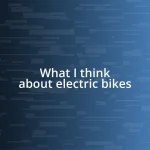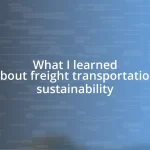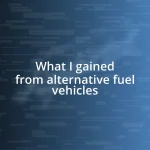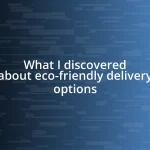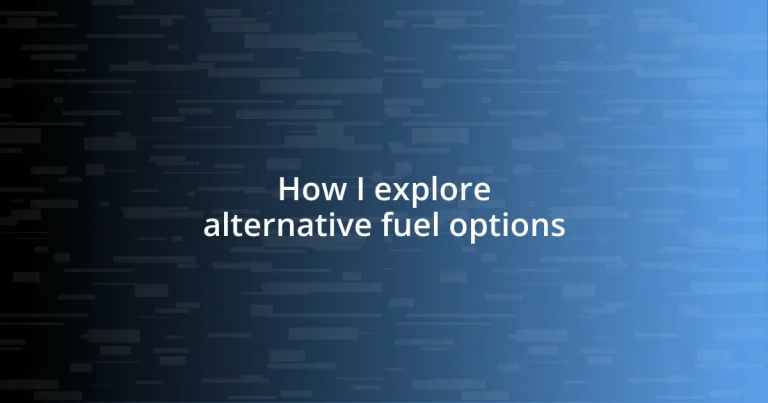Key takeaways:
- Alternative fuels, such as electric, hydrogen, and biofuels, offer sustainable energy solutions that can significantly reduce greenhouse gas emissions and environmental impact.
- Community engagement and government initiatives are essential for increasing access to alternative fuel sources and promoting renewable energy adoption.
- Future trends indicate a shift towards electrification in public transport and advanced biofuels from waste, with hydrogen fuel cells emerging as a pivotal player in the clean energy transition.
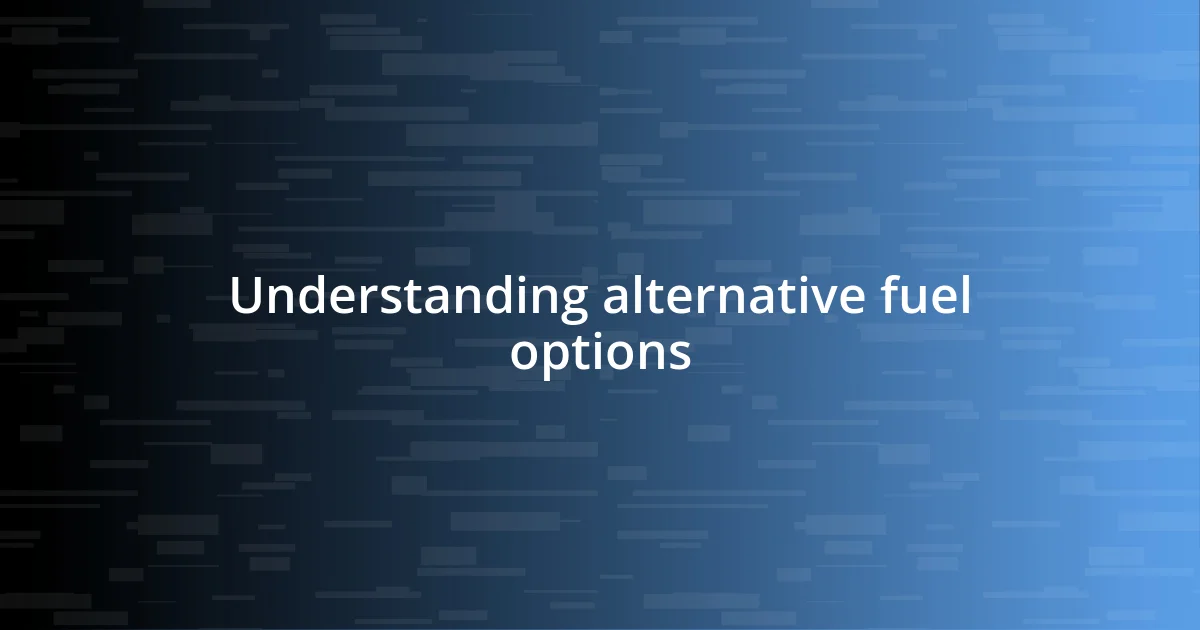
Understanding alternative fuel options
Understanding alternative fuel options involves delving into a varied landscape of energy sources that differ significantly from conventional fossil fuels. I remember the first time I discovered biofuels; it felt like unearthing a hidden treasure! The idea that fuel could be derived from organic materials really sparked my curiosity—how many other possibilities are out there that we’ve yet to explore?
As I learned more about different options like hydrogen fuel cells or solar-powered technologies, I was struck by the intersection of innovation and sustainability. It made me wonder: why aren’t we embracing these cleaner choices more widely? For instance, I once attended a workshop where a local entrepreneur shared his experience of converting waste cooking oil into biodiesel—talk about a “waste not, want not” mentality! This example illustrated that alternative fuels are not just theoretical; they’re practical solutions that can make a real impact on our environment.
I’ve found that understanding these options is not just about the technical aspects; it’s also about the stories behind them. Each alternative fuel source has the potential to reshape our energy landscape, but they also come with challenges that need addressing. What are your thoughts on the balance between innovation and traditional habits? As I’ve navigated this issue, I’ve developed a deeper appreciation for the potential and responsibility we have in making mindful choices for our planet.
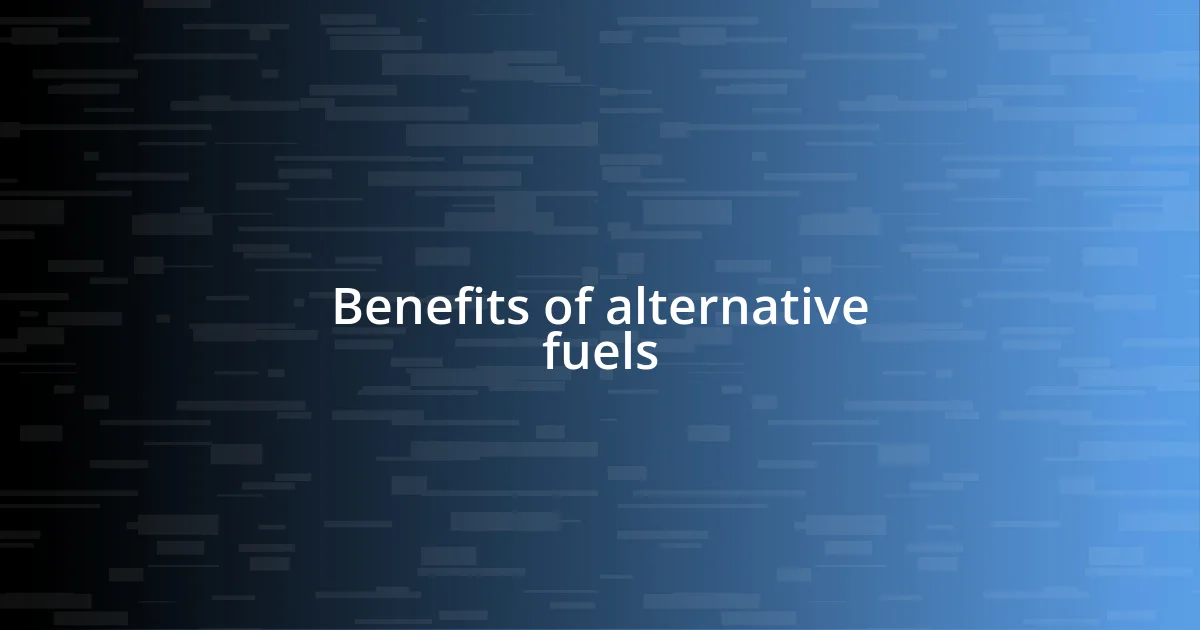
Benefits of alternative fuels
Exploring the benefits of alternative fuels has truly reshaped my perspective on energy consumption. One of the most compelling advantages is their potential to reduce greenhouse gas emissions and combat climate change. I remember speaking with a friend who switched to an electric vehicle; the excitement in his voice was contagious as he shared how much cleaner his car runs compared to a gas-powered one. It’s remarkable to think about how choosing alternative fuels could lead to significant improvements in air quality and public health.
The benefits of alternative fuels extend beyond environmental impacts. Here are a few key points that highlight why I find them so advantageous:
- Sustainability: Many alternative fuels are renewable, meaning they can be produced without depleting natural resources.
- Energy Independence: By investing in local energy sources, countries can reduce their dependence on imported oil, enhancing energy security.
- Economic Opportunities: The growth of alternative fuel industries can create new jobs in manufacturing, infrastructure, and research.
- Innovation Driving Change: Many alternative fuels are at the forefront of technological advancements. As I’ve witnessed in various forums, innovation in this field often leads to further breakthroughs across multiple sectors.
Reflecting on these benefits, it’s clear that alternative fuels not only stand to transform our energy systems but also offer new pathways for societal progress.
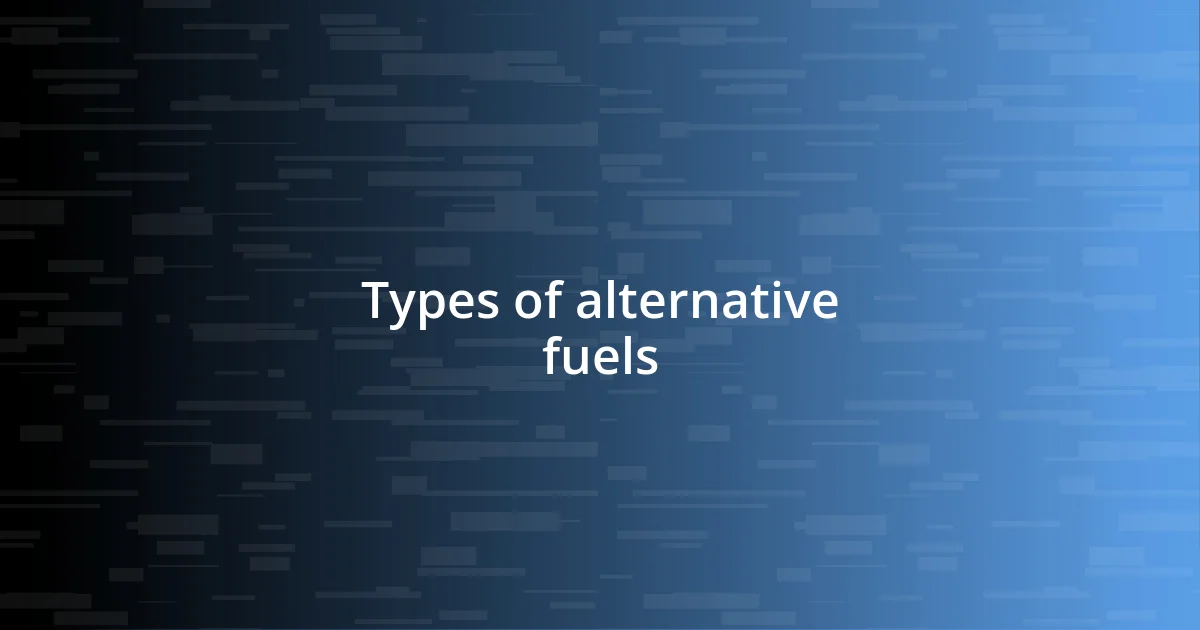
Types of alternative fuels
Exploring alternative fuels is like opening a door to a world filled with possibilities. Among the various types, electric fuels are gaining traction rapidly. When I first saw a solar-powered vehicle gliding down the road, a sense of hope washed over me. It’s not just about greener transport; it symbolizes a shift toward a sustainable lifestyle that resonates with many people today.
Another exciting option worth mentioning is hydrogen fuel. The first time I learned about hydrogen fuel cells, I was captivated by the science behind them. Imagine a car emitting only water vapor instead of exhaust fumes! I remember discussing this with a group of friends, and the excitement was palpable. We envisioned a future where our cars wouldn’t just be modes of transport but also beainers of clean energy in urban environments.
Lastly, biofuels are another significant alternative, derived from organic materials. I had the chance to volunteer at a local biodiesel production facility one summer, and it was an eye-opener. Watching how waste materials like used cooking oil were transformed into clean fuel was nothing short of inspiring. It made me feel that, as a community, we could harness our waste and turn it into something valuable, reinforcing a culture of sustainability.
| Type of Alternative Fuel | Source |
|---|---|
| Electric Fuels | Electricity generated from renewable sources |
| Hydrogen Fuel | Produced from water through electrolysis |
| Biofuels | Derived from organic matter like plants or waste |
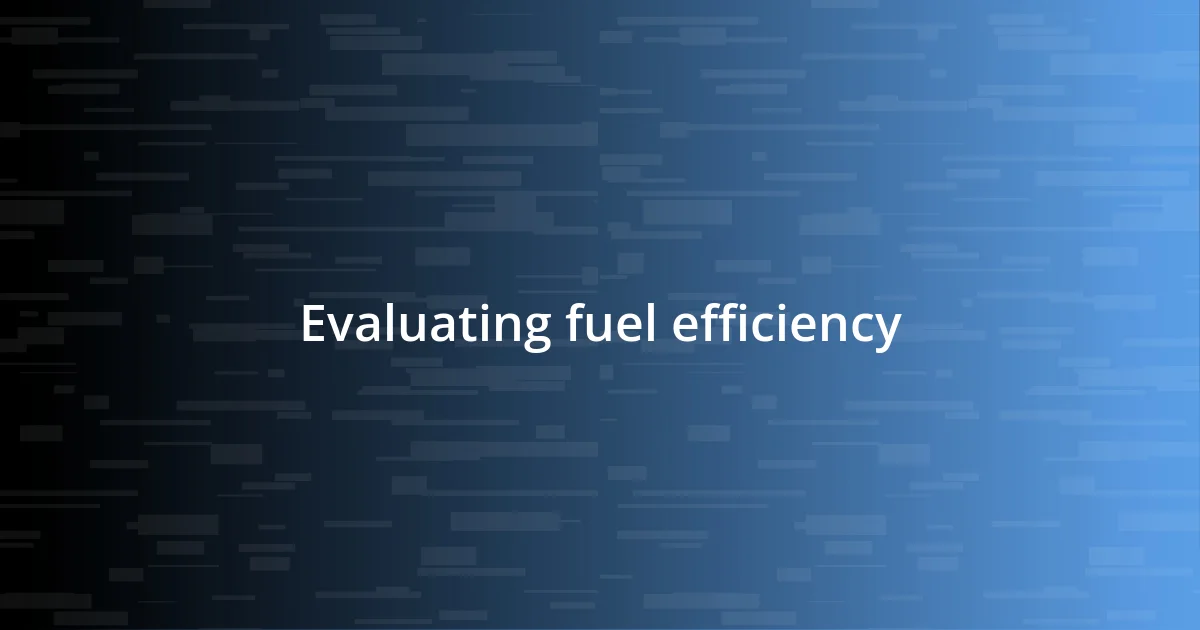
Evaluating fuel efficiency
Evaluating fuel efficiency is crucial in understanding how different fuels can impact our daily lives. When I first began exploring alternative fuels, I was fascinated to learn about miles per gallon (MPG) equivalents in electric and hybrid vehicles. This metric helps quantify how far a car can travel using a certain amount of energy. It made me wonder, how much farther could we travel with cleaner options if we pay attention to efficiency?
Moreover, I recall a discussion I had with a mechanic friend who pointed out how vehicle weight plays a role in fuel efficiency. He emphasized that lighter cars typically use less fuel. This realization opened my eyes to the innovation efforts in the auto industry, focusing on materials that don’t just reduce weight but also enhance safety. What if we could push these advancements further with alternative fuels?
As I continue to evaluate various fuel options, I’m struck by the idea that efficiency isn’t solely about numbers on a fuel gauge. It’s also about the lifestyle changes I can make. For instance, the time I chose to use a bike for short trips instead of driving illuminated the positive impact on my wallet and my health. Isn’t it fascinating how evaluating fuel efficiency can extend beyond traditional quantifications, into our choices and actions?
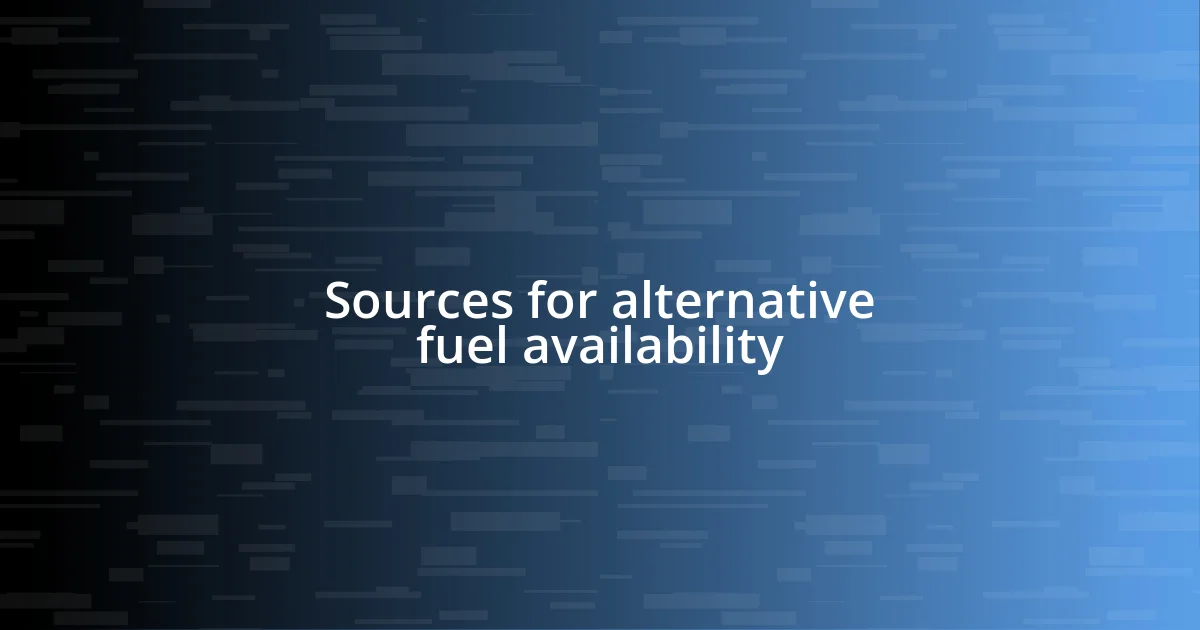
Sources for alternative fuel availability
The journey to find alternative fuel sources often leads me to surprising places. For instance, I stumbled upon a local community forum focused on sustainability, where residents shared information about solar farms and wind energy projects. The enthusiasm was contagious. People detailed how they accessed renewable energy and even how they converted their homes, creating a network of support that I found encouraging. Isn’t it inspiring to think that communities can harness such power together?
I also discovered that government initiatives play a pivotal role in making alternative fuels more accessible. In my city, I attended a workshop on incentives for electric vehicle (EV) charging stations. It struck me how many resources were available for those willing to invest in renewable options. The excitement in the room was palpable as attendees learned about tax rebates and grants. Who wouldn’t get energized by the idea of reducing their carbon footprint while also saving money?
Moreover, I’ve been curious about the availability of biofuel in my region. Visiting a local farm that harvests crops specifically for biofuel production opened my eyes. They shared stories of how they convert their excess crops into fuel that powers nearby vehicles. It made me reflect: what if every community could transform their agricultural waste into energy? Wouldn’t that create a sustainable loop of energy and resources that benefits everyone?

Future trends in alternative fuels
Looking ahead, I’m excited about the electrification of public transport. Recently, I took a trip to a city that has made significant shifts toward electric buses. Seeing those quiet, emissions-free vehicles gliding through the streets made me think: how much cleaner could our air be if more cities adopted similar solutions? It feels like a powerful step toward a more sustainable urban environment.
Another trend catching my attention is the rise of advanced biofuels, particularly those produced from waste. I remember watching a documentary about a facility that transforms food waste into biodiesel. The innovation was astonishing! Could we really turn what we throw away into a resource that fuels our vehicles? Imagining a future where our trash powers our cars is both thrilling and perplexing.
Finally, the potential of hydrogen fuel cells seems to be gaining traction and I’m genuinely intrigued by this. I’ve read about ongoing projects where researchers are exploring how to use excess renewable energy to produce hydrogen. This approach could revolutionize energy storage. Isn’t it fascinating to consider that hydrogen, the most abundant element in the universe, could play a pivotal role in our transition to a clean energy future? As I explore these trends, I can’t help but feel hopeful about the possibilities that lie ahead.


